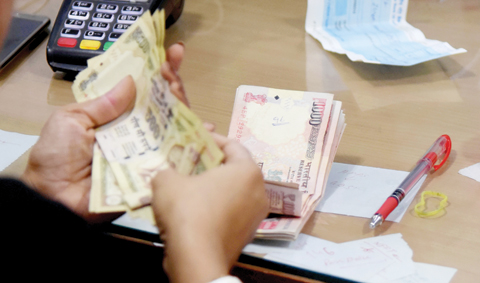
KUWAIT: Money
exchange centers across Kuwait witnessed an unusual rush yesterday, with Indian
expats scrambling to send money home as the Indian rupee tumbled to this year's
lowest level yesterday. One Kuwaiti dinar fetched 236.93 Indian rupees, while
the currency traded around 71.98 against the US dollar in forex markets,
recording one of the worst performances in its history.
According to
experts, the rupee had been on a rollercoaster ride all along this year,
primarily due to the weakening of investor sentiment, with the Indian economy
showing signs of a sharp slowdown. "There is a confidence crisis in the
Indian market today, prompting foreign funds to flee the country. Many
industries are also taking cover and biding time in view of the growing
turbulence in the global market," said Deepak Chandra, a market specialist
in Mumbai, over the phone.
Global rating
agency Moody's last week lowered the growth projection for India during 2019
and 2020 to 6.2 and 6.7 percent respectively. The global economic outlook also
remained cloudy following a sharp escalation of a trade war and signs of a
looming recession. At the interbank foreign exchange, the Indian rupee opened
weaker yesterday at 71.65 a dollar and went on to touch the day's lowest level
at 71.98. It finally settled at 71.81, down 26 paise against the American
currency, the lowest in 2019.
"For
expatriates, the plunge of the rupee's value may appear as a bonanza as they
can send more money to India. But it is a matter of grave concern for Indians
and the domestic economy," said Satish Chandran, who works at an
investment company in Kuwait City. "High value remittances to India have
increased significantly in the last few weeks and volumes also have risen,"
said Anasuddeen, an employee working with an exchange company in Salmiya.
However, many
forex specialists are of the view that a plunge of the rupee usually doesn't
help expats in low-income categories much. They are not in a position to
increase the amount they regularly remit, they said. Although the India
government has initiated a few measures to bolster financial market sentiment
and boost businesses, many key sectors continued to witness double-digit rates
of contraction in net sales in the April-June quarter of financial year 2019.
Many experts are of the opinion that that the Indian currency may continue to
remain volatile as both domestic and global economic prospects remain
uncertain, at least for the short term.
By Sajeev K Peter










